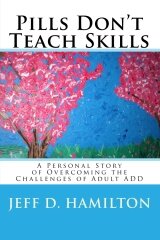By Guest Blogger Marina Salsbury – Around two thirds of attention-deficit sufferers experience symptoms into adulthood and college life. College students struggle with transitioning to college classes because their ADD hinders their  organizational skills and the ability to complete tasks. In addition, college students no longer have their familiar support system of relatives, close friends, and long-time doctors to help them through the hurdles.
organizational skills and the ability to complete tasks. In addition, college students no longer have their familiar support system of relatives, close friends, and long-time doctors to help them through the hurdles.
Students struggling with ADD typically are easily distracted and have difficulty completing assignments and organizing daily tasks in order of importance. These difficulties can have a major effect on their performance in regular and online classes for college. They are used to the routine schedule of high school, and may need extra time to adjust to college with classes offered all day long, late-night study sessions, chaos in the dormitories, and an uncertain sleep schedule. Since students with ADD thrive on routine, these changes will shock them unless they put some thought into coping strategies before going off to college.
College students with ADD facing their freshman year should analyze daily habits during the summer to see what they can do on their own without parental help. Do they know how to do their own laundry, shop for the toiletries, and wake up to stick to a schedule without prompting?
Incoming students should also become connected with services on campus. Meeting with the disability support office, academic advisers, and staff at student learning centers will line up specific accommodations for students’ needs. Support services can assist ADD students by providing a note-taker, arranging for extra time on exams, and other special accommodations as need be.
Incoming students with ADD may also need medication doses adjusted in light of the different circumstances they’ll face in college. With longer class schedules and studying late at night, students need medication that will keep them alert and focused at all times. It may be best for students to find a doctor on or near campus with whom they can discuss treatment options, including taking longer-acting medication, as they adjust to the college situation.
Students must consider dealing with daily tasks and keeping up with classes as well. Teaching students how to keep a daily planner where they can jot down test dates, assignments, and appointments and then cross them off as they’re completed will help them keep priorities organized. Along these lines, instructors will help students by asking what steps they will take to complete a long-term project in stages, which aids students by breaking it into smaller pieces and forming attainable goals.
Students with ADD can survive at college just as well as any other incoming freshman. They just need to take advantage of support resources on campus, choose classes carefully so that they’re confident they can handle the workload, and communicate with instructors as necessary so that they understand students’ needs. A little forethought and preparation goes a long way to preventing major stress and keeping ADD under control in college and beyond.
Marina Salsbury planned on becoming a teacher since high school, but found her way instead into online writing after college. She writes for Online College Classes and other sites about everything from education to exercise.





